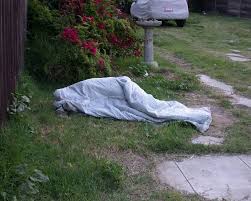
A fellow living in Golden Gate Park in San Francisco said that he preferred the term above to "homeless." One thing about people who more or less completely drop out of the network of society's compromises is that they typically develop droll senses of humor. Thoreau certainly had one. Thoreau considered himself a denizen of the woods while he lived at Walden Pond between 1845 and 1847, but I doubt that he would have objected to "urban outdoorsman" as an interchangeable term. Thoreau, after all, went to Harvard and held jobs in the straight world before he decided, at the age of 28, that such a "lifestyle" was too limiting and decided to transact his business directly with nature.
This guy living in GG Park, Tom Sepa by name, resides in a tent in less-traveled parts of the park, places where Mayor Gavin Newsom's homeless-rousting cops are less likely to find him. He has a laptop and a cell phone and works as a telemarketer, logging on each morning at a Richmond District cafe. He prefers the park to homeless shelters because he doesn't like the annoying presence of drunks and dopeheads in the city facilities. He says he makes about $2,000 to $3,000 a month, and can save almost all of it. He maintains a low overhead, of course, but his budget allows him to check into a motel about twice a month for a shower. He's got a line on available bathrooms in the area and prefers Starbucks, since you can lock the door.
I would imagine that Tom knows firsthand that Thoreau's essential premise, that the fundamental requirement of life is the maintenance of vital heat, is ineluctable. You have to eat to fuel metabolism and protect yourself from the elements to conserve the heat thus generated. An energetic scientist (in both senses of the word) writes:
"I've mentioned to you before the parameter of daily energy expenditure called the Physical Activity Level (PAL), which is the ratio of daily total energy expenditure over the resting metabolic rate. 70 kg humans rest at about 75 watts and typical hunter-gatherers have a PAL of about 2.0. So on an average day primitive humans operate at about 150 watts over the 24 hr of a day (put another way, a total daily energy expenditure of 24 hr x 150 watts = 3.6 kilowatt-hrs). The US energy grid is delivering about 3.4 terawatts at any given moment, so the average American accounts for over 10,000 watts. It's like we have 10,000/150 = about 60 hunter-gatherers working for each of us around the clock."
A fellow like Tom Sepa obviously is not pulling his weight. I wouldn't be surprised if his body weight is the idealized 70 kg, but I would surmise that his exogenous power usage (unrelated to his own ambling and talking on his cell phone) is confined to plugging in his laptop at the Zephyr Cafe and recharging the phone. On the other hand, I'm sure he does a lot more walking than most Americans, but this pulls no power from the grid. He is not hunting or gathering, per se, but he is moving, which is closer to our aboriginal roots. Since he's not chasing down zebra, it's quite possible he's in the 1.5 range above resting wattage, a goal worthy of emulation.
The breakdown of the "consumer" economy, where finance plays a 20% role in our GDP and 72% of all GDP is related to consumer spending (and where manufacturing has shrunk to about 12% of GDP), will have the tendency to move the majority of Americans along a continuum away from Donald Trump and in the general direction of Tom Sepa, the Urban Outdoorsman. Despite the efforts of Washington D.C., with its bought-and-paid-for bias in favor of reestablishing the status quo ante, that of a Bubble Economy built upon extravagance, asset inflation and prodigious overuse of energy, we will move relentlessly toward simpler and less energy-intensive ways of maintaining our vital heat. We need this, the planet needs this. Maybe what the Obama Administration could do, most efficiently, is simply give us all of our money back (instead of giving it to Citigroup and B of A) and let us take it from here, establishing local economies built to local scale. Then Barack could become mayor of Washington D.C. and the Congress could hold hearings about holding hearings.
Americans are moving in these directions, mostly because they have no choice. We're driving less, saving more, and doing without. Imagine the cushion that most of us have versus the Urban Outdoorsman, who demonstrates how wide the margin is between waste and basic viability. Maybe we can cut down our personal hunter-gatherer workforce to, say, 30 aboriginals. We could do this while still living indoors if we think it through.



No comments:
Post a Comment